Chris Sebela continuously puts out great, interesting comics with a seemingly endless number of unique premises at his disposal. The first comic I read from him, though, was High Crimes, a thriller set near and on Mount Everest about men and women who sell the bodies of dead climbers back to their families. It’s always been a favorite of mine and I’m really glad I had an excuse to talk with Chris about it since it’s coming out through Image tomorrow, February 20th. If you’re not already convinced to check the book out, I hope this interview will put you over the edge.
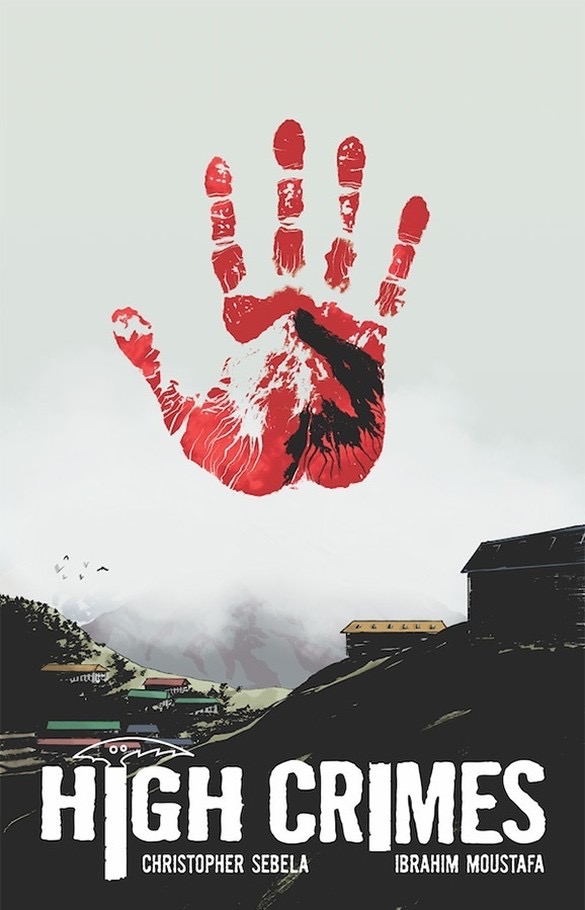
MO: I’m really glad to see High Crimes be republished. It’s still one of my favorite work of yours and Ibrahim’s
CS: Yeah, we’re both excited to get it back out there to a wider audience.
MO: It was kind of a breakout title for both of you, right?
CS: Yeah, it definitely changed our careers. Before that Ibrahim was drawing a book for IDW about dog catchers catching werewolves and I know he wanted to do something bigger and more personal. And I’d just sort of been struggling along. High Crimes was sort of my Hail Mary. I was thinking “Well if this doesn’t work then I guess comics doesn’t want me and I have to do something else.”
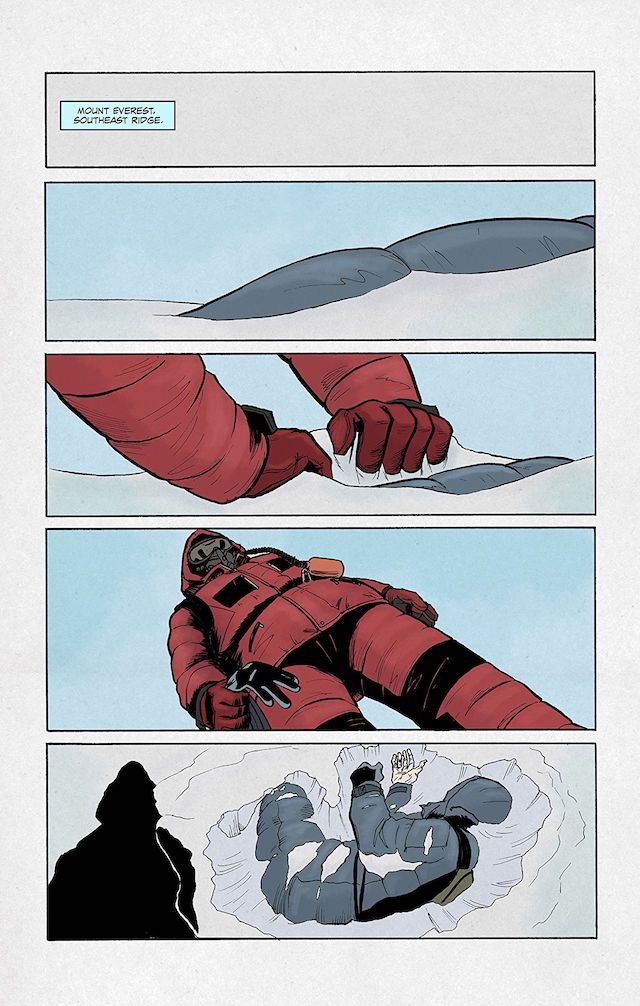
MO: It felt incredibly personal. Did that blend of hope and tragedy come from somewhere specific? Was it speaking to something you were feeling?
CS: There’s nothing specific that I can point to. I think it points to my general outlook. Especially nowadays I’m trying to hold out hope no matter how bleak things get. But the main character, Zayn, didn’t grow out of me [in any obvious way.] I’m sure there are parts of me in there but she’s not based on anyone I know or anything like that.
MO: I really appreciate that the book itself has this aura to it but doesn’t try to tell you something specific.
CS: Yeah, I’ve never tried to get too specific in any of my books about what to take away from it or, like, “here’s the theme or the message.” I figure that stuff is so dependent on who’s reading it, people can take away a message that I never intended. So for me it’s freeing to just let my subconscious go to work and not actively [decide what the story is saying]. Ideally that stuff comes through if I’m doing a good job and being true to myself.
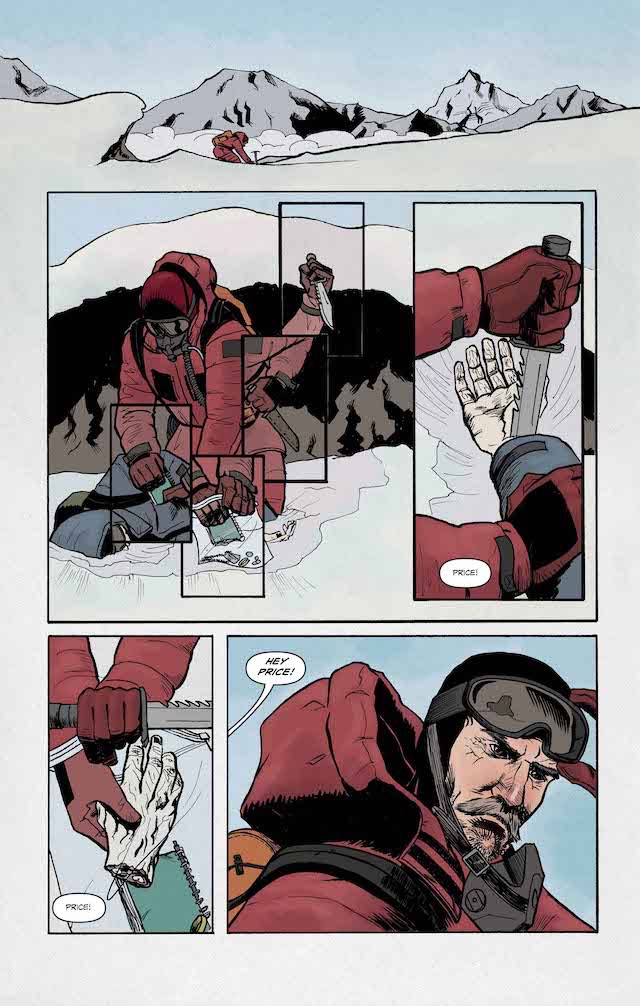
MO: I imagine it’s gratifying for people to come up to you and tell you what they got out of it instead of being told what you already know.
CS: Yeah, for sure. I often hear from people who take something away from something I considered just a throwaway. As a writer there are moments you pick out as [significant]. And then there’s what you do to fill it in and that might be the most important part to someone. It’s great and definitely opens my eyes to my own work. I kind of love not seeing what others are seeing until they come up and point it out to me.
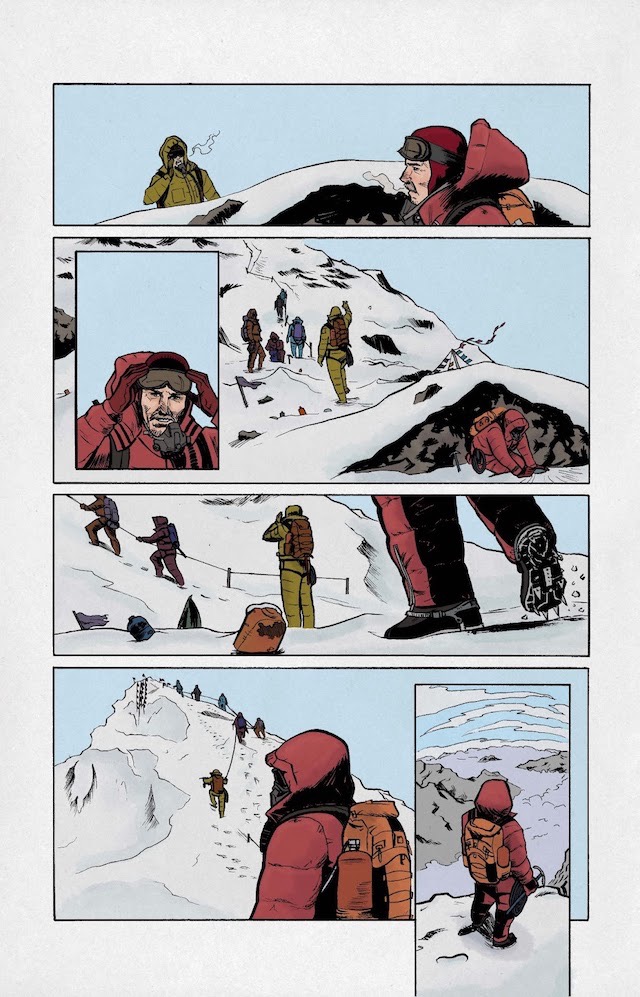
MO: Everest is such a perfect metaphor, something that can mean almost anything to anybody. It means multiple things just to Zahn, who’s afraid of finding out what’s left after climbing it but still wants to so bad.
CS: For years I was mildly obsessed with Everest, reading about and diving into the topic just for fun, which [made it easier] to track all those different views of Everest. The sherpas take it completely differently from the expedition leaders who take it completely differently from the people who paid $50,000 [for a vacation].
I wanted to write High Crimes just because I was obsessed with Everest, but the more I worked on it the more Everest became apparent to me. I guess it’s actually a symbol in our book too, but I never sat down and thought about it until I was far enough away from it.
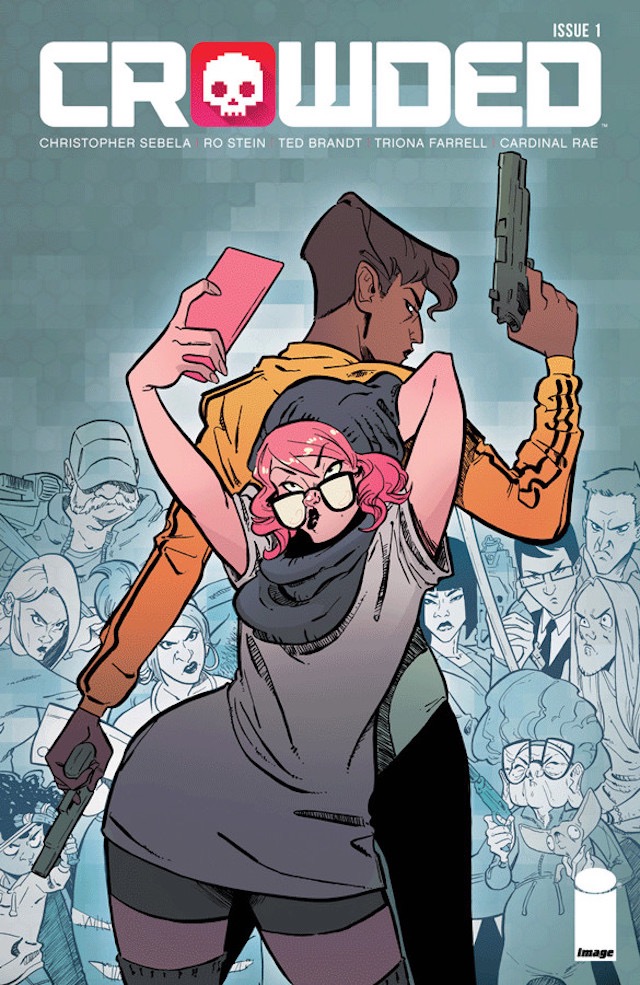
MO: What made Image the right place to go to republish High Crimes?
CS: My first comics work ever came out through Image and ever since I’ve been wanting to get back and I was like I’m just not ready yet. Finally with Shanghai and Crowded I was able to get back there. Ibrahim and I had always talked about doing a rerelease and hopefully opening it up to a wider audience and we can’t think of [a better way to do that] than through Image.
MO: Have you guys discussed working together again on a sort-of-sequel or a different project.
CS: Well, there are no sequels to this.
MO: Yeah, it would be hard to continue this story directly.
CS: [Laughs] Right. Though we‘ve had talks with like TV people who asked us how [to structure it] for five seasons. I could come up with some bullshit way. Yeah. We’ve talked about working.
Ibrahim has just blown up since High Crime’s original release and he’s a great writer all on his own. So I don’t know what’s going to happen. I hope another collaboration happens but I’d understand if it doesn’t. Now more than ever he certainly doesn’t need somebody writing his stories for him. So fingers crossed we can make it happen.I just feel lucky I got him for as long as I did.
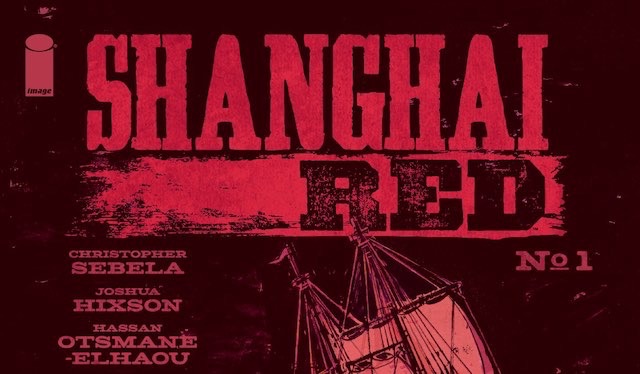
MO: Do you have editors on your Image books?
CS: I do. After writing High Crimes without an editor I knew I wanted one from then on. It was fun to write but without an editor there’s nobody telling you like when you’re screwing up, which is kind of liberating but also terrifying. My friend Andrea Shockling served as editor on Shanghai Red. That was a much looser arrangement, mostly just me sending her scripts and asking where I fucked up.
Juliette Capra edits Crowded and is largely responsible for that book existing. We’re friends and I’ve been showing her some of my comic stuff as I was working on it and she basically put me in touch with Ted [Brandt] and Ro [Stein]. They were looking for a project to call their own. I had around five different pitches I was trying to find artist for and she connected us has been kind of the guiding hand.
She’s definitely saved my butt several times by telling me when something doesn’t work. She doesn’t take my bullshit and calls me out when I need to be called out. Neither Andrea or Juliet had edited before but they’re both very literate and love comics. I think [most] people in editorial get their start from being asked by a writer to help them. Ask them to do something and. Maybe they love it. Or maybe they hate it but I wanted to.
MO: Do they help with the coordination between you, the artist, and the publisher?
CS: No. I that’s still basically a media job. They’re there to help with feedback by reading scripts or giving feedback on the art. I would love to step up to the ranks of having an editor who does all that but I’m not at a place right now where I can. Find somebody to do that and pay them what they deserve. So I just do it all. Which is why most of last year was a total blur.
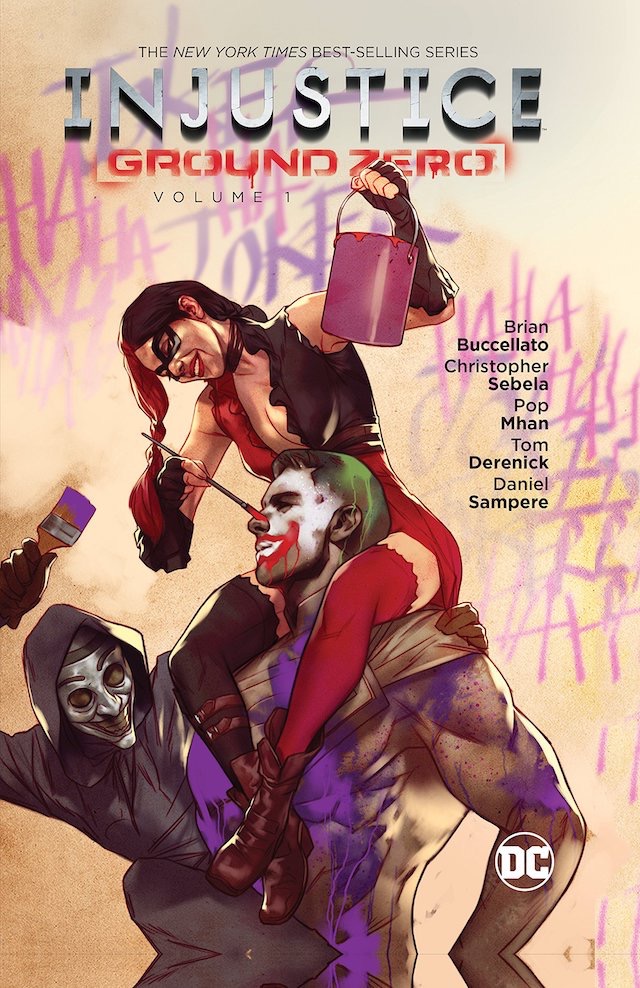
MO: You went through the DC Writers Workshop, right? Yeah. Did that open doors for you?
CS: It got me some shots at DC. I never would have had otherwise. I got. To write Pretty much the entirety of Injustice Ground Zero. And I got to tell a long running story about Harley Quinn breaking free of being the pawn of an abusive asshole and stuff. So those were the doors the Workshop opened for me.
I don’t know that it really busted anything open beyond that. I’ve always been more interested in creator owned stuff. Everybody’s time on this planet is limited and I have all these stories. I mean, I wouldn’t say no if they asked me to write Batman, but it’s definitely not the thing that excites me most about comics.
MO: Have you talked with anyone in Hollywood about getting your work adapted?
CS: Yeah. Crowded got optioned before the first issue came out. They flew me down in October. I met Rebel Wilson and the screenwriter she hired who now hits me up with questions. They’re very invested in keeping the movie [faithful to] the book, which I certainly didn’t expect but they seem into it.
Something of mine just got optioned last week that I can’t talk about but. I have an agent now which helps with that stuff. So he’s out there hustling for me and I don’t know if any of this stuff is actually going to come to fruition but the important thing to me is that it puts a little bit of an extra spotlight on our books and gives everybody on the team some extra spending money they weren’t expecting. I’m up for optioning everything if only because it helps get you through those lean periods.
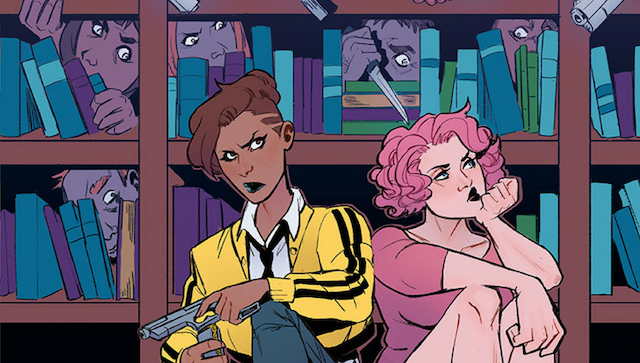
MO: You’ve never had a really long-running creator-owned book. Is that a big goal of yours?
CS: I don’t know. I’m a fan of stories that have a beginning and an ending. I guess I tend not to think that long, maybe because of my own predilections for what I like to consume. I like punchy stuff that gets in and gets out. I never want to be on Season Whatever of Lost where Paulo and Nikki are wandering through the jungle.
Maybe it’s because I grew up on 12 issue maxi-series which always seemed so huge to me. 12 issues is always sort of what’s in my own head. [Rarely] anything north of 15. Crowded is the longest I’ve envisioned and that in my head is twenty four issues.
If a story that suggests longer page count I would certainly consider it. But the market changes so much it’s hard to figure out how to make a long-running comic unless you’re a hot shit writer. I’m not that so I have to hustle more. I feel like I would have to crowdfund something that would go really long.
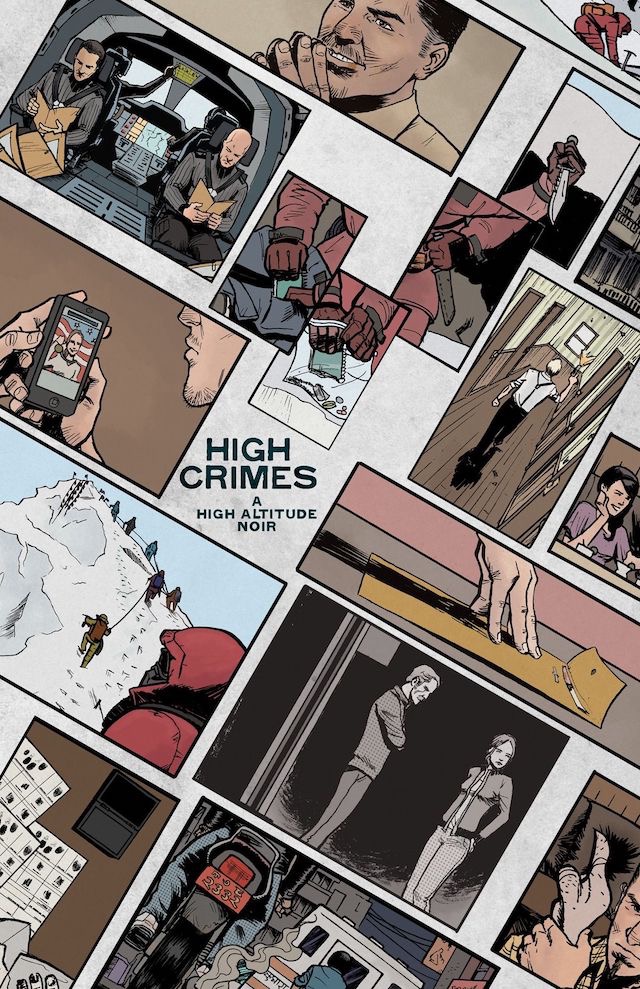
MO: At this point in the industry I feel like 24 issues is the new 75.
CS: [Laughs] Yeah, it certainly feels like this impossible thing. I always think of things In terms what’s the ideal length and then what I think I can actually get away with. Until I get more stuff out there and have a more stable base a long-running series isn’t on my mind.
Every book is like a crapshoot, you never know what’s gonna happen. I’m not at a point yet where I can have a book totally turf out. I’m still thinking small. If I get [an idea for] my 30 issue masterpiece then I’ll hopefully get popular enough that I can go somewhere and make it.
MO: Well I’m glad get to tell the stories you want to be telling.
CS: Yeah, I feel pretty lucky about that. Dead Letters went on for for 12 issues and it was the first creator owned book I sold to a publisher. Sometimes it works out and it’s really awesome. Sometimes it doesn’t and you have to wrap up sooner, but always feel good that at the end of the day I’m getting more of my stories out there and building a library. I spent so long not doing anything with my writing ability that now I feel like I have to play catch up.
You can follow Chris Sebela on through his website christophersebela.com and on Twitter @xtop. High Crimes releases through Image Comics tomorrow.
Matt Chats is an interview series featuring discussions with a creator or player in comics, diving deep into industry, process, and creative topics. Find its author, Matt O’Keefe, on Twitter and Tumblr. Email him with questions, comments, complaints, or whatever else is on your mind at [email protected].


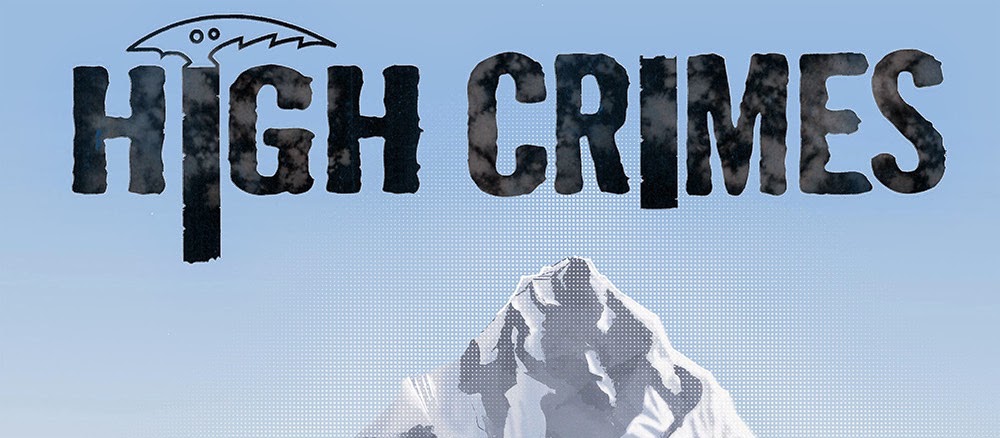
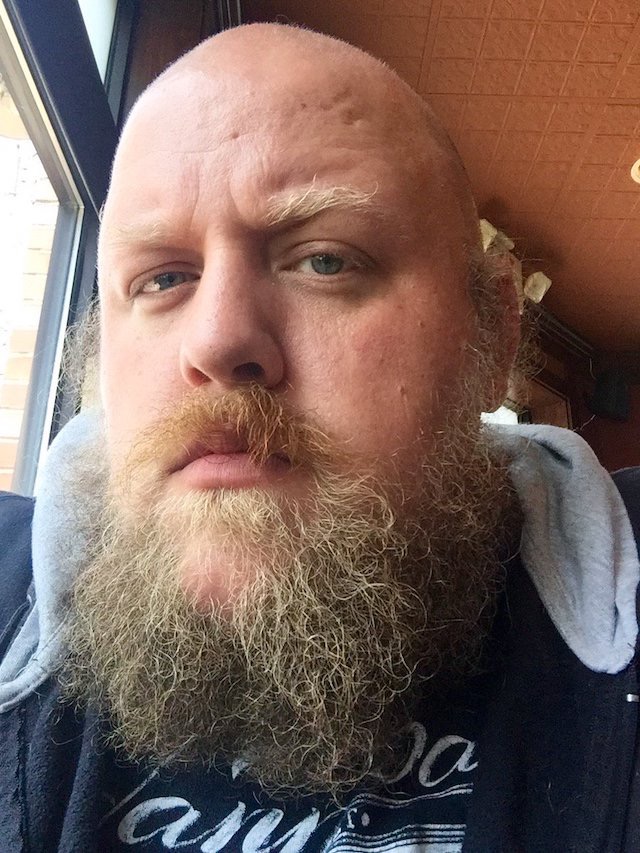

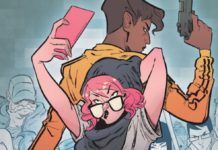




Never heard of High Crimes before, but I’m sold. Great interview and great writer!
Comments are closed.